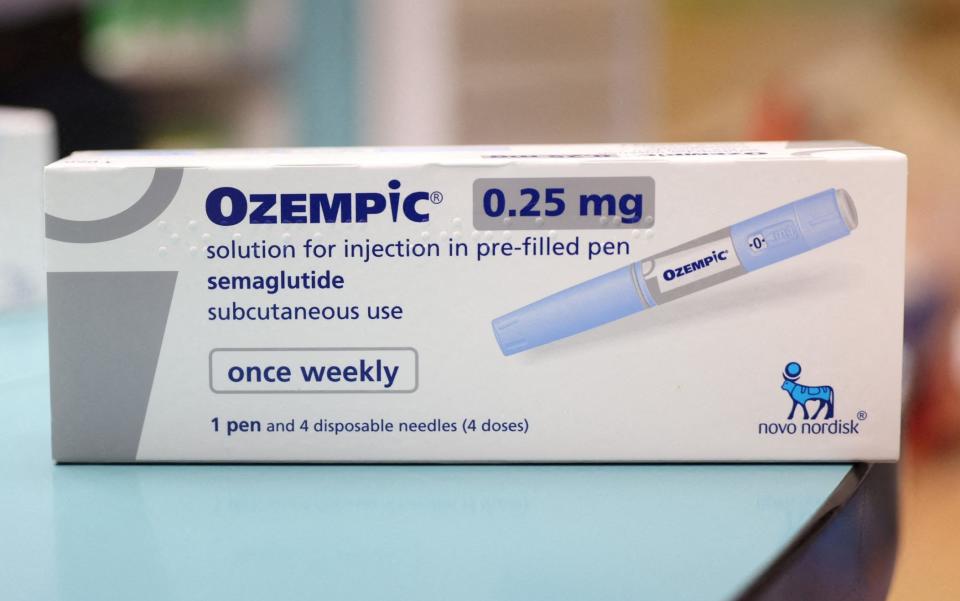Weight-loss injections could halve risk of cancer

Weight-loss jabs like Ozempic could cut the risk of cancer by up to half, according to breakthrough research.
The GLP-1 agonist drugs, which are licensed to treat obesity and diabetes, could revolutionise cancer care after studies found they reduced the risk of obesity-related cancers, such as breast, pancreatic and liver cancers, by a fifth, and bowel cancer by half.
Experts say the injections, which include semaglutide used in brands Ozempic and Wegovy, could “delay or prevent” cancer.
Scientists believe there are “additional mechanisms” at play beyond the weight loss such as reducing a patient’s desire to smoke or drink alcohol, as well as provoking an immune response and preventing inflammation.
A landmark trial presented at the American Society of Clinical Oncology annual conference by researchers from Case Western Reserve University (CWRU) in the US analysed more than 34,000 obese patients whose body mass index was over 35 and found the pioneering injections reduced the risk of developing 13 types of obesity-related cancers.
It compared cancer rates among patients who had used a weight-loss jab for at least a year to those who had undergone bariatric surgery, and those who had no treatment, over a 15-year period.
The researchers found that the risk of cancer fell by 19 per cent in both those who used weight-loss jabs and those who had undergone bariatric surgery, despite the latter losing “significantly” more weight.
The authors also found patients on the weight-loss jabs were half as likely to die over the 15 years, while those who had bariatric surgery were 14 per cent less likely to die.
They said the findings suggest the class of drugs act in a way that directly prevents cancer.

Dr Cindy Lin and Dr Benjamin Liu, co-authors from CRWU in Ohio, said: “Our findings are significant in that they could change the paradigm of obesity management by suggesting early intervention with GLP-1 RAs could delay or prevent obesity-related cancer development.”
They said there are “multiple ways” the drugs could reduce the risk of cancer and that laboratory and mice research “has shown that GLP-1s cause the death of cancer cells and prevent them from multiplying”, while other studies “have suggested that they reduce inflammation”.
Dr Julie Gralow, America’s top cancer doctor and chief medical officer of the American Society of Clinical Oncology (ASCO), said it would be “the icing on the cake” if they could be used in cancer care.
“People are very interested in these drugs. They are interested in studying, are there other metabolic effects besides the weight that have benefits? We’ve talked for a long time about metabolic syndrome and its impact on cancer risk, recurrence and cancer survivors. It will be studied, I am sure of that,” she said.
“I do think that there are so many potential and already proven health benefits to these drugs, that it would be the icing on the cake if we saw that they were also reducing cancers. I am very hopeful about overall improvements in health from this class of drugs,” she added.
It comes as a separate study by scientists at CWRU found the drugs cut the risk of bowel cancer by up to half in patients with type 2 diabetes.
Researchers looked at more than 1.2 million patients starting diabetes treatment and found those who were overweight or obese and used the GLP-1 injections, which were initially licensed to treat diabetes, were 50 per cent less likely to develop bowel cancer than patients on insulin.
While losing weight is known to help cut the risk of cancer, the scientists also observed a 44 per cent risk reduction across all diabetes patients using the jabs regardless of weight.
The authors also compared patients on other common diabetes medications such as metformin, SGLT2 inhibitors, sulfonylureas, and thiazolidinediones, over a 15-year period, and found that cancer rates were lowest in weight-loss jab users.

Prof Rong Xu, professor of biomedical informatics and director of CWRU’s centre for artificial intelligence in drug discovery said it was an observational study and “could not characterise the mechanisms underlying the observed 50 per cent reduction in colorectal cancer risk”.
“We speculate that it may involve both weight loss – since we observed more profound effects in patients with obesity – and additional mechanisms other than weight loss, such as immune modulation, and reduced desire for alcohol drinking or smoking,” he said.
The drugs, which have also been found to slash the risk of death from heart attacks or strokes by a fifth, are now being tipped as the next potential breakthrough in cancer care.
Separate research presented at the ASCO conference found the weight-loss drugs could reduce the risk of relapse and improve long-term survival in breast cancer patients.
A study of 75 women with breast cancer by researchers from the Memorial Sloan Kettering Cancer Centre in New York found that more than half were taking long-term hormonal therapy drugs to control the disease which can cause weight-gain that subsequently increases the risk of relapse.
They found that after 12 months of treatment with a jab, the breast cancer patients lost 5 per cent of their weight, suggesting the injections could become another tool in treating the disease and reducing the risk it returns.
Dr Sherry Shen, the lead author, said: “We know that weight gain is associated with worse survival rates after breast cancer diagnosis. Obesity can also make some cancer therapies less effective.
“GLP drugs are very promising and we hope someday they will be a tool in cancer treatment.”
Co-author Dr Neil Iyengar added: “Reversing weight gain is important from a risk-reduction perspective to reduce the risk of recurrence or cancer spreading.”

